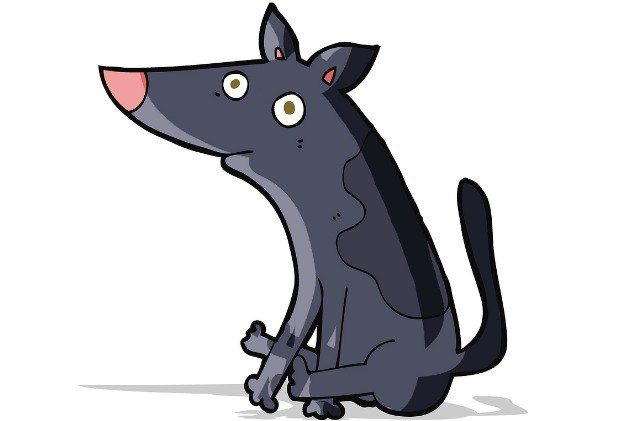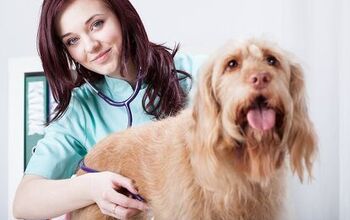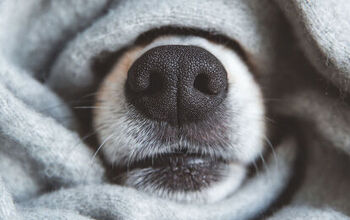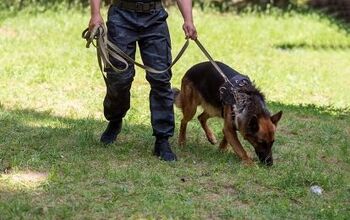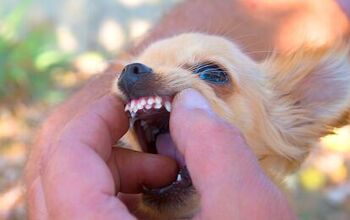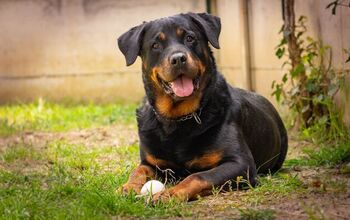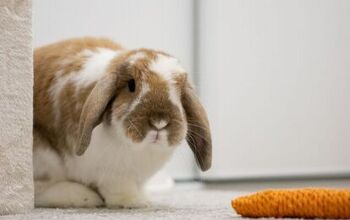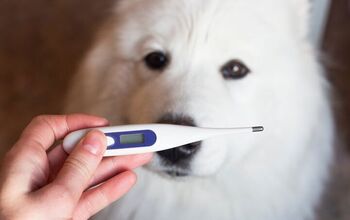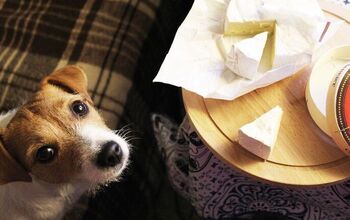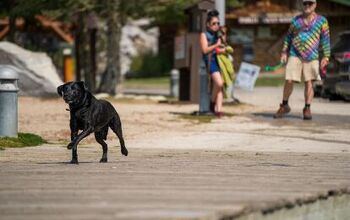Dog Scooting: The Sad, Scratchy Story Of Oscar’s Ichy Butt

Oscar has the art of dog scooting mastered. He’s been practicing this graceful dance of his people since I can remember. My hardwood floor gives him little relief, so when Oscar spies rugs and carpeting, he will unashamedly sit down, kick his hind legs forward and drag his arse until satisfaction has been achieved. This isn’t so much of an issue when we’re at close friends’ and family’s houses – they think it’s hilarious. But if it’s at the home of someone new or we’re out in public (the pavement gives him amazing ass-wiping traction), let’s just say that Oscar always makes a lasting impression.
I’ve taken him to the vet numerous times about his dog scooting issues, and as of yet, there’s no solid answers. It’s not his anal sac – that was my first guess. But after an unwelcome finger probing, infection and a full sac was ruled out.
Related: How To Treat A Dog With Allergies
Sure, the vet had plenty of “maybes” and “try this,” but no definitive results or cures. Because there’s no bleeding and he’s not doing it all day long, I get the feeling that Oscar’s derriere dragging is more of a nuance we’re going to have to live with. It’s a bit red at times, but not raw. He licks it occasionally – I’m not sure if he does it to soothe his bum or as a douche move to gross me out (he’ll try to kiss me after a thorough cleaning).
Does your pooch engage in dog scooting? Here are just a few reasons why dogs scoot:
Allergies: When I mentioned the dog scooting issue to the vet and he ruled out anal sac problems, he thought that it could have something to do with Oscar’s diet. If he is allergic to something in his food, it could be causing a bum irritation – as they say, what goes in must come out.
Anal Sac: You know how dogs get to know each other by sniffing butts? That’s because of the anal sac giving off a lovely doggy odor. But sometimes the anal sac can become full, infected or inflamed, which causes an overwhelming urge to itch.
You see, dogs anal sacs release a foul liquid when they poop. Now, that sounds gross, but it’s really important. That’s THEIR smell–their territory marking. It’s like a biomarker that lets other dogs know, “Hey. I was here.”
When your dog has a healthy gut, he’s going to have healthy poop. Simple as that. And that’s important because it’s your dog’s bowel movement that makes sure his anal sacs empty. If the poop is the right consistency and form, it’ll be the perfect pressure to gently express your dog’s anal sacs each time he poops. Perfect pooping means your dog’s anal glands shouldn’t get inflamed. It’s that inflammation that makes the liquid in their sacs get a bit more goopy and glumpy solid, and that means they don’t empty as easily. More, they can get infected, which can lead to itching and scooting to relieve the pain and itch. They can even get so inflamed and irritated they bleed. That’s a ruh-roh you need to address immediately.
Resolution: Work on ensuring your dog’s poop is like it needs to be. One supplement we like a lot is Bernie’s Perfect Poop. Yes, it’s designed for just this reason–to be perfect poop that can help express anal glands each time your dog does his doodie duty. It’s a combination of fiber, pre- and probiotics and digestive enzymes that work together to ensure that your dog’s digestive system moves his poop along as it should through the digestive system. The big, important factor in Bernie’s Perfect Poop for anal gland issues is its fiber content. Perfect Poop is over 50% fiber–premium Miscanthus grass. That fiber helps firm your dog’s stool as it moves through his intestines and that firmness is what will help your dog’s anal glands naturally release. Think of that perfect log of poop being an anal gland massager every time it leaves the shoot. Sounds super glamorous, we know, but the bottom line is that Bernie’s Perfect Poop helps anal glands express on their own because of all the fiber and that’s what you want.
Visit your veterinarian if the problem continues and seems serious. Antibiotic ointment and warm compresses may also be recommended.
“If your dog’s glands look very enlarged or they’re having bloody discharge, it’s time to see your vet,” says Sara Ochoa, DVM. “If the anal glands are very full, we express them. When they are infected, dogs get a round of antibiotics and sometimes pain medication.”
Scooting helps to relieve the pain and discomfort to the area. A vet can discharge the sac and prescribe a dose of antibiotics if necessary. If your dog does have anal sac problems, keeping a close eye (ha!) on his rear end will help prevent flare ups. Have a vet or groomer express the anal sac – although, Oscar scoots right after he gets probed (I don’t blame him).
Related: Stylish Tips For DIY Dog Grooming Success
Grooming: I find that Oscar does more dog scooting than normal after a trip to the groomer. It may be because that area has just been shaved or the shampoo the groomer uses irritates his skin. He zooms around for a few days after a haircut, but it tapers off once the fur starts to grow back. If this is the case for your pup, make sure the groomer knows. Often, express anal glands is part of the trip to the groomer. If your dog’s poop isn’t doing the trick, the groomer will. Just let them know to maybe try to keep a bit more hair so the itchies of new hair growth don’t make them want to scratch.
Cling-Ons: When you have a furry little butt, no matter how cute it is, poop can get stuck. Those dingleberries can make the fur around your dog’s bottom become matted, and get irritated and itchy. Some warm, soapy water can clean up this issue, or if it’s being really stubborn, you may have to cut the poopy mats out. It’s gross, but it’s gotta be done.
Tapeworms: Not all dogs who have tapeworms scoot, but it is a sign of an infestation. If it is worms, you will be able to see the offending buggers in the anus. The good news is they are easy to treat and get rid of. Tapeworms usually come out in full force in the summer time, so keep an eye out for dog scooting during the warmer months.
Manly urges: It’s no secret that men like to scratch their neither regions. Front or back, guys don’t usually have a preference and seem quite comfortable doing it in public. Hey, I get it – an uncomfortable itch or wedgie can drive the sanest of us mad with that intense irritation. So I’m thinking that perhaps Oscar is just trying to express his manly urges. This makes sense to me. He doesn’t have many testosteroney outlets to express himself. While there’s no scientific evidence to back my claim, until I get some solid results from the vet, I’m keeping this one as a front-runner.
Since my vet doesn’t think it’s a problem, I’m stuck with trying to find some relief for Oscar’s itchy issue. Do you have any recommendations? Supplements, herbs, grooming tips – I’m happy to hear them all, so please leave your thoughts in the comment section below.

Amy Tokic, Editor of PetGuide.com, is a passionate animal lover and proud pet parent of Oscar, a Shih Tzu/Chihuahua cross, and Zed, a Japanese Chin. Her love of animals began in kindergarten, when she brought her stuffed dog Snoopy into class with her every day. Now, she writes about her adventures in pet ownership and tirelessly researches products, news and health related issues she can share with other animal enthusiasts. In her free time, Amy loves perusing used book and record stores, obsessing over the latest pet products available and chasing squirrels with wild abandon (a habit attributed to spending too much time with her pooches).
More by Amy Tokic



